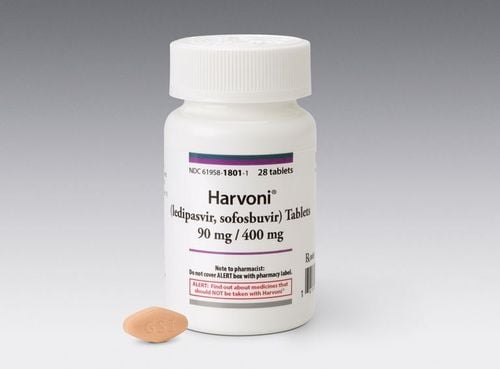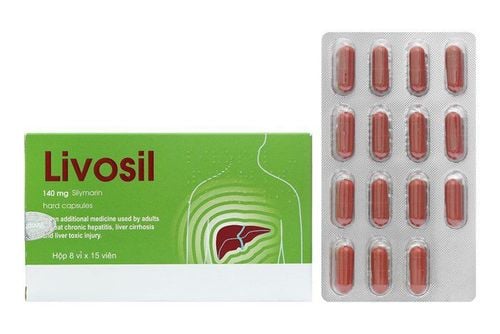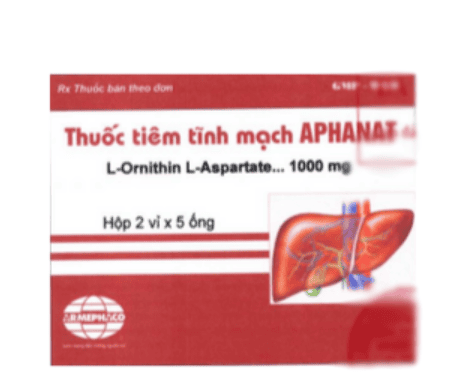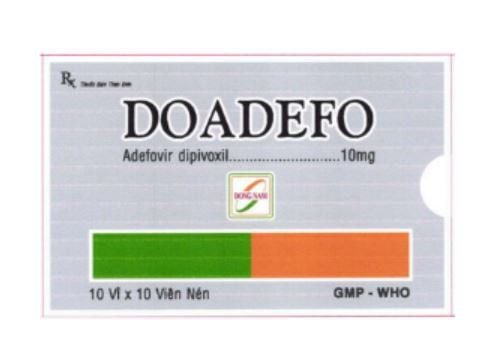This is an automatically translated article.
Pegnano is used to treat chronic hepatitis B and chronic hepatitis C. The active ingredient in the drug is Peginterferon alfa - 2a. To ensure effective use, users need to follow the instructions of their doctors, and refer to more information about the uses of Pegnano in the article below.
1. What are the uses of Pegnano?
1.1. What is Pegnano? Pegnano belongs to the group of liver - bile - kidney drugs, with registration number VD-13197-10, manufactured by Nanogen Pharmaceutical Biotechnology Co., Ltd - Vietnam.
Pegnano medicine has the main active ingredient is Peginterferon alfa -2a 180 mcg, is prepared in the form of white sterile lyophilized powder.
Types of packaging:
Box of 05 vials of injection solution (each vial has a capacity of 1 ml); Box of 01 vial of lyophilized powder with 1 vial of 1 ml solvent containing 9mg of Benzyl alcohol in 1mL of distilled water for injection; Box of 06 pre-filled syringes with injection solution (capacity of 0.5 ml). The drug Pegnano is recommended for use in adults.
1.2. What does Pegnano do? Pegnano 180mcg is prescribed by doctors for:
Treatment of chronic hepatitis B: In both cases of HBsAg negative or HBeAg positive in patients without cirrhosis or with cirrhosis. , a compensated liver, evidence of viral replication, elevated serum alanine aminotransferase (ALT) levels, and hepatitis. Treatment of chronic hepatitis C: With a positive HCV-RNA blood test, including patients with compensated cirrhosis and/or HIV co-infection. The therapeutic efficacy of Pegnano in chronic hepatitis C is enhanced when co-administered with Ribavirin. Pegnano/Ribavirin combination therapy is indicated in first-time patients and in patients who have previously failed Interferon alfa (modified peginterferon alfa-2a or conventional) as monotherapy. whether or in combination with interferon alfa with ribavirin.
Pegnano monotherapy for chronic hepatitis C is only applicable in cases where the patient is intolerant or has contraindications to Ribavirin.
Contraindicated to use Pegnano in the following cases:
Patients are sensitive to Interferon alfa, allergic to the main active ingredient Peginterferon alfa-2a or to any of its ingredients. Patient has autoimmune hepatitis. Patients with severe liver dysfunction, decompensated cirrhosis. Infants and children < 3 years old, due to the excipients Benzyl alcohol, are dangerous to children. Previous history of severe cardiovascular disease, including unstable or uncontrolled cardiovascular disease in the previous 6 months. Initiation of Pegnano is contraindicated in patients with HIV and HCV co-infection with cirrhosis and a Child-Pugh score of 6. Concomitant use with telbivudine.
2. Usage of Pegnano
2.1. How to take Pegnano Pegnano is injected under the skin of the thigh or abdomen. When injected under the skin in the arm, the effectiveness of Pegnano 180mcg will be reduced. Each syringe should only be used by 1 person and used only once. Pegnano is only for injection, made by medical staff, patients must not use it on their own and absolutely must not use the wrong way. Pegnano should be injected on a certain day of the week for the drug to be fully effective during the treatment period. After mixing with 1 ml of the accompanying solvent for injection (distilled water for injection containing 0.9% benzyl alcohol), a clear, colorless injection solution is obtained, with no observed precipitation or foreign bodies. Once dissolved, injection can be started. 2.2. Dosage of Pegnano for the treatment of chronic hepatitis B: 1 dose (180 mcg) per week, lasting for 48 weeks.
Treatment of chronic hepatitis C:
People who have never been treated with Pegnano 180mcg before: 1 dose (180mcg) per week. Combined with ribavirin (taken immediately after meals) to increase the effectiveness of treatment. The duration of dual therapy also depends on the genotype of the virus that the patient has. Treatment-experienced patients: 1 dose (180 mcg) weekly in combination with Ribavirin 1000 - 1200 mg daily for 16, 24 or 48 weeks. For patients with genotype 1 virus infection who have not responded to previous treatment with Pegnano and ribavirin, continuous treatment for 72 weeks is recommended. Hepatitis C and HIV coinfected patients:
The recommended dose for ribavirin alone or in combination with ribavirin is 1 dose (180 mcg) weekly for 48 weeks. If HCV virus has genotype 1 use ribavirin 1000 – 1200 mg a day. If HCV virus is different from genotype 1 use ribavirin 800mg a day. Patients with hepatic impairment:
ALT levels should be monitored to adjust the dose of Pegnano. Patients with renal impairment:
Mild to moderate: No dose adjustment of Pegnano is required. Severe and terminal stage: Use Pegnano at a dose of 135 mcg/time per week. Handling missed dose:
If it happens that you forget the injection dose of Pegnano, immediately go to the place where you can administer the injection as soon as you remember. Because there is only one injection per week and it is recommended to choose a fixed day of the week to inject, it is better to set an alarm or remember it on the calendar to avoid forgetting to inject. Treatment of overdose:
Because the drug is administered by medical staff, it will limit the overdose, but there are still cases of accidental overdose, it is necessary to immediately contact the treating doctor and If necessary, you should go to a medical facility for monitoring and treatment.
3. Notes when using Pegnano
Before using Pegnano, it is necessary to:
Carry out hematological tests and periodically check again after 2 and 4 weeks because single dose or combination therapy reduces the total white blood cell count (WBC) and white blood cell count. bridge neutral (ANC). This usually starts to happen within 2 weeks of starting treatment. Single-dose or combination therapy also reduced platelet counts and returned to pre-treatment levels during post-treatment follow-up. If the platelet count is < 50,000 cells/mm3, the dose should be reduced, and if the platelet count is < 25,000 cells/mm3, treatment should be discontinued. Biochemical tests should also be performed after 4 weeks. This additional examination is necessary and should be performed periodically during treatment (including glucose monitoring). Evaluation of T4 and TSH Levels: It is recommended that patients with pre-existing cardiovascular abnormalities have an electrocardiogram prior to administration of Pegnano. If there is any sign of worsening of cardiovascular status during the treatment period, treatment should be withheld or discontinued. In patients with cardiovascular disease associated with anemia, a dose reduction or discontinuation of ribavirin may be necessary. Patients may experience confusion, dizziness, drowsiness or fatigue, so caution should be exercised when driving or operating machinery. Do not use the drug for pregnant and lactating women because there have not been many studies using Peginterferon alfa-2a for this group.
4. Side effects of Pegnano
At therapeutic doses, Pegnano is well tolerated. However, during the use of Pegnano, patients may still experience side effects such as:
Common:
Bacterial infections: Upper respiratory tract infections, bronchitis, oral candidiasis, Herpes simplex. Blood and lymph: Anemia, thrombocytopenia and lymphadenopathy. Psychiatric: Mood swings, anxiety, emotional disturbances, decreased libido, depression, and insomnia. Endocrine: Hypothyroidism or hyperthyroidism. Neurological: Migraine, memory impairment, neurasthenia, syncope, paresthesia, dysesthesia, taste disturbance, tremor, nightmares and somnolence. Cardiovascular: Peripheral edema, tachycardia and palpitations. Eyes: Eye pain, blurred vision, eye inflammation and ophthalmic disease. Ear and Vestibular: Dizziness and ear pain. Respiratory, thoracic and mediastinal: Nosebleeds, sinus congestion, nasal congestion, nasopharyngitis, rhinitis, pharyngitis and dyspnea on exertion. Gastrointestinal: Vomiting, dyspepsia, dysphagia, mouth ulcers, flatulence, dry mouth, bleeding gums, glossitis and stomatitis. Skin and subcutaneous tissue: Urticaria, eczema, psoriasis, rash, hyperhidrosis, skin disorders, night sweats, photosensitivity reactions. Musculoskeletal and Connective Tissue: Back pain, muscle weakness, arthritis, bone pain, neck pain, musculoskeletal pain and cramps. Reproductive: Impotence. Other: Chest pain, flu-like symptoms, hot flushes, thirst, and coma. Uncommon:
Infections: Skin infections and pneumonia. Psychiatric: Hallucinations, suicidal ideation. Immune: Thyroiditis and Sarcoidosis. Cardiovascular: Hypertension. Endocrine: Diabetes. Respiratory, thoracic and mediastinal: Wheezing. Neurological: Some peripheral neuropathies. Hepatobiliary: Liver dysfunction and liver cancer. Metabolism: Dehydration. Eyes: Retinal hemorrhage. Musculoskeletal and Connective Tissue: Arthritis, muscle weakness, bone pain, back pain, neck pain, musculoskeletal pain and cramps. Ear: Hearing loss. If you experience these symptoms, the patient should stop using Pegnano and notify the doctor for appropriate treatment.
5. Pegnano drug interactions
Co-administration of Pegnano with Theophylline: Because Pegnano inhibits CYP1A2, it reduces the metabolism of theophylline leading to a 25% increase in AUC. It is necessary to monitor the plasma concentration of the drug and adjust the dose of theophylline. Co-administration of Pegnano with Methadone : Leads to increased methadone levels, so it is important to monitor for signs and symptoms of methadone toxicity. Concomitant use with Telbivudine: Due to an increased risk of developing peripheral neuropathy. To avoid interactions, before being prescribed Pegnano, the patient should inform the doctor about the drugs they are using, including dietary supplements. The doctor will base on that to prescribe the appropriate Pegnano.
6. How to store Pegnano
The shelf life of Pegnano is 24 months from the date of manufacture. Store in powder form at a temperature of 15 to 30 degrees Celsius, away from direct light and places with high humidity such as bathrooms. Solution stored at a temperature of 2 degrees C - 8 degrees C (in the refrigerator) can keep stable for 30 days, but must not be frozen. Keep Pegnano out of the reach of children and pets. Above is all information about Pegnano drug, patients need to carefully read the instructions for use, consult a doctor / pharmacist before using. Note, Pegnano is a prescription drug, so patients are absolutely not allowed to self-medicate at home because they may experience unwanted side effects.













